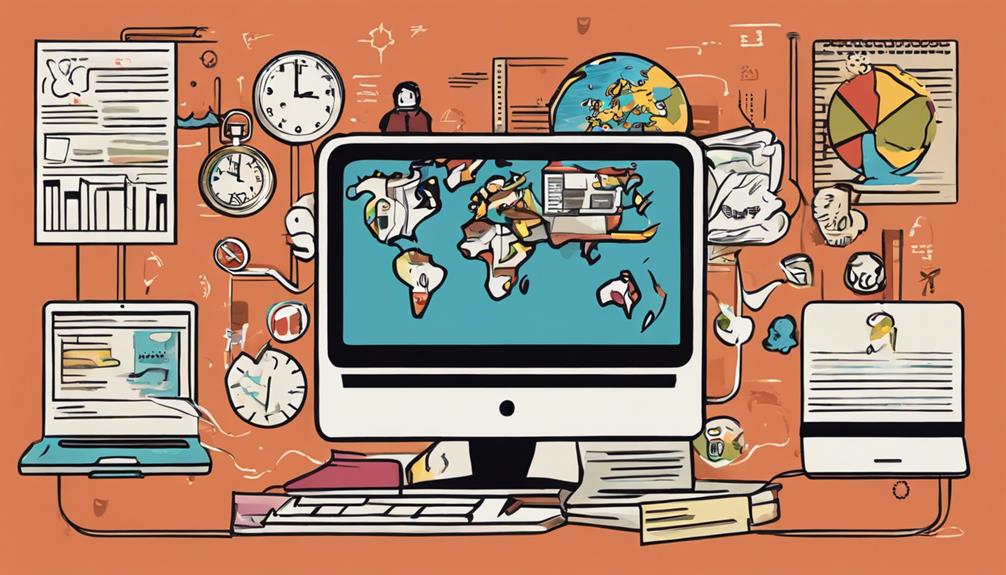Embracing workplace conflict can genuinely boost innovation by turning differing opinions into valuable insights. When you engage in open dialogue, you challenge existing ideas and reveal diverse perspectives that spark creative solutions. This process fosters resilience and enhances your communication skills, ultimately strengthening team dynamics. Conflicts also clarify goals and reveal unmet needs, driving strategic planning. By creating an environment where all voices are heard, you encourage collaboration and trust among your colleagues. A deeper understanding of these dynamics can unveil even more potential for your team, paving the way for greater innovation. Explore how to harness this power further.
Key Takeaways
- Embracing conflict encourages diverse perspectives, leading to innovative solutions and creative problem-solving within teams.
- Open dialogue during conflicts enhances communication, fostering stronger relationships and collaborative efforts.
- Addressing disagreements clarifies goals and uncovers unmet needs, driving strategic innovation.
- Conflict challenges existing ideas, promoting exploration and experimentation crucial for growth.
Understanding Workplace Conflict
Workplace conflict isn't just a source of stress; it can be a powerful catalyst for growth and innovation when navigated effectively. You might find that differing opinions and viewpoints challenge your current understanding, pushing you to think critically.
Engaging in conflict helps you articulate your needs and desires, fostering not only resilience but also confidence in your communication. When you embrace these disagreements, you reveal your own communication style and behavioral patterns, which can enhance your relationships and strategic planning.
Positive Outcomes of Conflict
Embracing conflict can lead to positive outcomes that enhance creativity, communication, and collaboration within teams. When you engage in productive conflict, you open up avenues for diverse ideas and solutions. Here's how conflict can benefit your workplace:
| Benefit | Description | Outcome |
|---|---|---|
| Enhanced Communication | Encourages open dialogue | Stronger relationships |
| Diverse Perspectives | Brings varied viewpoints | Innovative solutions |
| Increased Clarity | Refines ideas through discussion | Better decision-making |
| Personal Growth | Promotes self-awareness and resilience | Improved emotional intelligence |
| Strengthened Collaboration | Fosters teamwork through shared goals | Higher team productivity |
Conflict as a Catalyst for Innovation

Conflict can spark innovation by challenging existing ideas and encouraging fresh perspectives that drive creative solutions.
When you engage in discussions that involve differing viewpoints, you create a rich environment for exploration and experimentation. This exchange of thoughts not only refines your understanding but also pushes you to think outside the box.
You might uncover unmet needs or desires that lead to new approaches and strategies. Embracing conflict helps you develop resilience and confidence in your communication, fostering a culture where innovative ideas can thrive.
Leadership's Role in Conflict
Effective leaders navigate conflict by fostering an environment where open dialogue and differing opinions can thrive, turning potential disputes into opportunities for growth.
By modeling vulnerability and encouraging team members to voice their concerns, you create a culture that values diverse perspectives. This approach not only enhances problem-solving but also builds trust within your team.
As a leader, it's essential to actively listen, validate feelings, and facilitate constructive discussions. When you embrace conflict as a natural part of the workplace, you empower your team to challenge assumptions and innovate.
Fostering a Healthy Work Environment

Creating a healthy work environment involves nurturing open communication and trust, allowing team members to express themselves freely while feeling valued and respected.
When you encourage honest dialogue, you'll discover that employees are more engaged and willing to share innovative ideas. Make it a point to actively listen to their concerns and suggestions, fostering an atmosphere where everyone feels heard.
Recognizing individual contributions helps build mutual respect, strengthening team dynamics. Promote collaboration by facilitating team-building activities, which can break down barriers and enhance relationships.
Remember, a supportive environment not only boosts morale but also enhances productivity, ultimately driving your organization toward success.
Prioritizing emotional well-being and inclusivity will create a culture where conflict is embraced as a tool for growth.
Techniques for Resolving Disputes
Several techniques can help you resolve disputes in the workplace, promoting a more harmonious environment.
First, practice active listening; it shows respect and helps you understand different perspectives.
Next, focus on the issue, not the person, to prevent escalation and maintain professionalism.
You can also encourage collaboration by brainstorming solutions together, which fosters teamwork.
Implementing a structured approach, like using 'I' statements, allows you to express feelings without assigning blame.
Additionally, mediation can be effective; consider involving a neutral third party to facilitate discussions.
Finally, set clear expectations and follow up to guarantee everyone is on the same page.
Encouraging Open Communication

Open communication is essential for resolving disputes and fostering a collaborative workplace environment. When you encourage open dialogue, you create a space where everyone feels valued and heard. This not only helps in resolving conflicts but also sparks creativity and innovation.
Here are some effective ways to promote open communication:
- Encourage feedback: Actively seek input from team members to foster a culture of sharing ideas.
- Practice active listening: Show genuine interest in others' perspectives, which helps build trust.
- Set regular check-ins: Schedule consistent meetings to discuss concerns and progress openly.
Measuring Innovation Growth Through Conflict
Conflict can serve as a powerful catalyst for measuring innovation growth, revealing how diverse perspectives lead to creative solutions.
When you embrace conflict, you create an environment where ideas can clash, sparking fresh thinking and unique approaches. By addressing disagreements openly, you not only clarify your goals but also uncover unmet needs within your team.
This process fosters resilience and enhances communication, allowing you to identify effective strategies for collaboration. You'll find that innovation often emerges from these challenging interactions, as they prompt you to rethink existing practices and drive necessary changes.
Ultimately, embracing conflict enables you to track innovation growth more accurately, showcasing the value of diverse viewpoints in your organization's progress.
Frequently Asked Questions
How Can Conflict Improve Team Collaboration and Trust?
Conflict can enhance team collaboration and trust by encouraging open communication, allowing you to express differing perspectives. When you address disagreements constructively, it strengthens relationships and fosters a more resilient, united team atmosphere.
What Role Do Personal Biases Play in Workplace Conflict?
Personal biases can cloud your judgment in workplace conflict, leading to miscommunication and misunderstandings. Recognizing these biases helps you approach situations more objectively, fostering better collaboration and reducing tension among team members.
Are There Specific Industries More Affected by Workplace Conflict?
Certain industries, like healthcare and tech, face heightened workplace conflict due to high stakes and rapid change. You'll often navigate competing priorities and diverse perspectives, making conflict resolution essential for effective teamwork and innovation.
How Can Remote Teams Manage Conflict Effectively?
You might think remote teams can't manage conflict effectively, but open communication, regular check-ins, and clear expectations foster collaboration. Encourage active listening and empathy to address issues and strengthen relationships, ensuring everyone feels heard and valued.
What Are the Long-Term Effects of Unresolved Workplace Conflict?
Unresolved workplace conflict can lead to decreased morale, increased employee turnover, and poor collaboration. You might find communication breaks down, productivity suffers, and a toxic environment develops, ultimately hindering overall organizational success and growth.
Conclusion
By boldly embracing workplace conflict, you're not just tackling tension; you're transforming it into a treasure trove of ideas.
This dynamic dance of disagreement delivers diverse perspectives, driving innovation and deepening connections.
As you cultivate a culture of candid communication, you'll see collaboration flourish, fueling both personal and professional growth.
So, step into the fray with confidence—your commitment to constructive conflict can spark significant success and shape a brighter future for your team.









